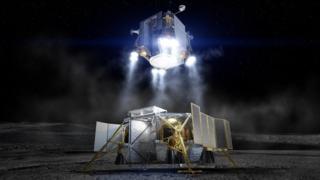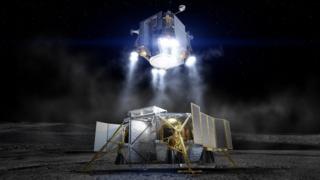Boeing aims for Moon landing in ‘fewer steps’
The aerospace giant unveils its proposal for a lander that could take humans to the lunar surface. …

 Image copyright Boeing
Image copyright Boeing Aerospace giant Boeing has unveiled its proposal for a lander that could take humans to the Moon’s surface.
Under a programme called Artemis, the White House wants to return humans to the Moon by 2024.
Its approach, named “Fewest Steps to the Moon”, would use the huge Space Launch System (SLS) rocket.
The company says its plan reduces the complexity involved in sending several different bits of hardware into space on multiple launches.
For most robotic space missions, all the hardware needed for the mission is launched on one rocket. Likewise, the crewed Apollo missions to the Moon in the 1960s and 70s required only one lift-off.
However, the Artemis missions are expected to involve several flights to loft all the hardware needed. For example, the lander elements are likely to be launched separately from the Orion capsule carrying crew.
Bezos floats ‘national team’ to build Moon lander
Boeing says it can land astronauts on the Moon with only five “mission critical events” – such as launch, orbit insertion and others – instead of the 11 or more required by alternative strategies.
Nasa previously said its preferred option was a lunar lander split into three stages, but it left the door open to “alternative, innovative approaches”.
Boeing’s proposal uses just two stages – a descent element that gets astronauts down to the surface, and an ascent element to get the crew off the surface and back into lunar orbit at the end of a mission. They are designed to be launched as one unit.
The company says its lander can carry itself from lunar orbit to the surface without an additional transfer element, or “tug”, as previously specified by Nasa.
This, it said, would further reduce the launches needed for a mission and simplify the steps required for a successful landing.
The company says its lander would be ready for the 2024 mission, called Artemis-3. But Boeing’s plan would depend on a more powerful variant of the SLS rocket called Block 1B.
Under current Nasa plans, the Block 1B version of the rocket wouldn’t be ready until 2025.
However, Nasa’s procurement process allows for the use of two separate landers from different companies on the Artemis-3 and Artemis-4 missions (Artemis-4 is due to fly in 2025).
“Whether serving in Nasa’s 2024 or 2025 mission slot, Boeing’s approach maximises return from agency investments in previous and ongoing programs to allow for the simplest and therefore highest probability path back to the lunar surface,” the company said in a statement.
The lander will use key technologies from Boeing’s CST-100 Starliner capsule, designed to carry astronauts to the International Space Station (ISS).
The Boeing lander would be able to dock with the Gateway, a planned space station in lunar orbit, but it would not require it. It could instead dock with Nasa’s Orion spacecraft directly for a simpler mission profile.
Last month, Amazon founder Jeff Bezos announced the formation of a “national team” that would make a separate bid to build the lander for 2024.
Bezos’ space company Blue Origin has teamed up with aerospace giants Lockheed Martin, Northrop Grumman and Draper to put together a proposal for a three-stage lander.
Follow Paul on Twitter.


